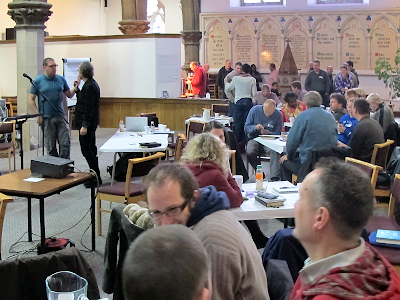 |
| The view towards Coniston |
I knew that if I began by speaking these words out, the rest of the prophecy would follow, but I didn't feel it would be acceptable to just speak, and I knew that if I'd gone to the front and asked to share it, the moment would have gone and I'd have lost the flow.
There's an immediacy about prophecy that will not be denied. So I borrowed a pen and jotted the words down as they came. Here they are.
Come to the mountain. Come!
From the mountain comes your salvation.
From the mountain comes your holiness.
From the mountain comes your light.
From the mountain comes purpose, grace, glory, power, peace, love, honour, authority and hope.
Come to the mountain.
I AM that Mountain.
I AM the Rock of your salvation.
I AM dependable.
Now I say to you, go in my Name,
Go in the authority, grace, love and peace that I have poured out upon you.
Go into the world, for I AM with you.
I don't know that these would have been the words I would have spoken; they are almost certainly not. But the gist of the message is probably the same.
Coming and going - And it seems to me that coming to the Mountain and going into the world are at the heart of all that we do. Jesus says, 'Come to me everyone who is tired and struggling, I'm gentle and I'll give you rest. My load is light, the weight I lay on your shoulders is manageable and comfortable' (Matthew 11:28-30).
In coming to him we will also be gathering together. When we are where he is, we will inevitably find his other followers in that same place. We don't gather because we decide to be together, we gather around him. Moths don't gather as a cloud because they want to be together but because they are drawn to the light.
Does he send us out together? Yes he does. Jesus taught his followers to go out in twos (Luke 10:1-2). We are to go, not as a cloud around the Light who is Jesus, but in smaller groups. We do not go alone, we go in company, but we go in the company of a few.
So if we are attracted to him, we will be among many. But if we are obedient to him we will be among a few. And because we need to do both, sometimes we'll gather together and sometimes we'll go out with a few.
Basic rhythms of life - Coming into the Light and going in his Name are the basic rhythms of following Jesus [Tweet it!], they are the pattern of discipleship and missional living. These were the rhythms when he walked the dusty roads and hills of Galilee and Judaea with his followers, they were the same rhythms during the time of the early church, they are the basis of life for his persecuted people in China and Pakistan and Indonesia and many other places, and they are the same rhythms of discipleship and mission that the church in the West is beginning to rediscover.
So the call to all his people is twofold. 'Come to the Mountain' and 'Go into the world'. We are not truly following Jesus unless we are doing both. Come into his presence singing, 'Jesus is Lord'. Go into the world sharing in practical ways the good news that he is the Lord of love and of forgiveness and of freedom.
And rejoice! Again I say, rejoice!
Note: The photo was taken from near the top of Coniston Old Man, a mountain in the English Lake District. The view shows Coniston Water and the lovely little town of Coniston. Click the image for a larger view.
Questions:
- Are you gathering around the Light? Are you going into the world? Consider if and how you do these things.
- Is there anything you should change about your gathering and going? Pray about it.
- When you are on a mountain you can see the country below laid out like a tapestry, you see it as a whole in a way you cannot do when you are in it. Is this significant for discipleship and mission? In what way?
See also:
- Church Multiplication Associates (CMA)
- Coniston - Wikipedia
- Coniston Water - Wikipedia
- Cruising the gospel
- Cruising the gospel - Journeys of heart and mind
- House2House
- Newforms Resources
- Old Man of Coniston - Wikipedia
- Verge Network
- Viral Jesus - Journeys of heart and mind




